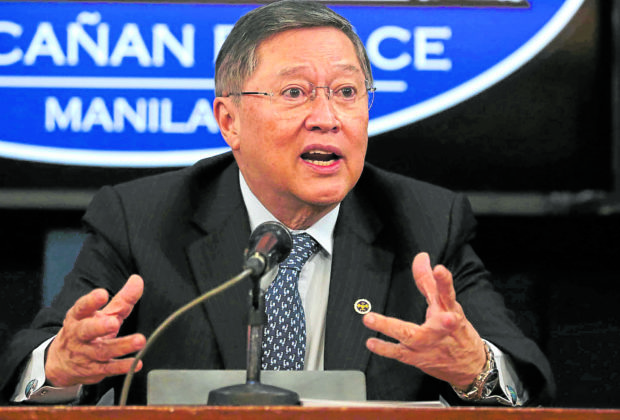Consumer gains due to lowered pork import tariffs ‘dwarf’ lost revenue — DOF chief

Finance Secretary Carlos Dominguez III. FILE PHOTO
MANILA, Philippines — Finance Secretary Carlos Dominguez III on Tuesday defended before the Senate the lowering of pork import tariffs, saying that consumer gains “dwarf” the foregone government revenues by P53.7 billion.
“I know that that EO [executive order] 128 appears to be a painful solution. Our revenues will drop by P13.68 billion. However, lowering the price of pork will save our consumers P67.38 billion,” Dominguez said as the Senate Committee of the Whole resumed its probe into the food security crisis triggered by the African swine fever (ASF) outbreak.
“These gains of consumers dwarf the foregone revenues by P53.7 billion. Clearly, this is a trade-off beneficial to the entire country,” he added.
President Rodrigo Duterte on April 7 signed Executive Order No. 128, which temporarily lowers tariff rates on fresh, chilled, or frozen pork meat “to address the existing pork supply shortage, stabilize prices of pork meat, and minimize inflation rates.”
In addition to lowering pork import tariffs, the President also endorsed to Congress the Department of Agriculture recommendation to temporarily increase the MAV for pork imports by 350,000 metric tons (MT) on top of the current 54,210 MT or a total of over 404,000 MT.
Lawmakers and local hog raisers, however, have repeatedly raised concerns over the said policies on pork importation, saying these would negatively affect the country’s swine industry.
But Dominguez said that these policies “will not kill” domestic hog raisers.
Like what the National Economic and Development Authority (NEDA) had earlier said, the finance chief said that the pork imports would only account for 22.8 percent of consumption in the country.
Further, Dominguez told senators that the adjustment in tariffs on pork imports “was not done haphazardly.”
“This emergency measure underwent extensive deliberation and consultation among concerned agencies and the public with all the trade-offs considered in the cost-benefit analysis,” he said.
He added that if pork tariffs remain at the same rate, the prices of pork kasim, liempo and other cuts would “keep on rising due to their shortage in the local market and inability of importers to bring them in because of high tariffs.”
Citing data from the Bureau of Animal Industry, Dominguez said that the country imported 256,017 MT pork meat in 2020.
Of this volume, about 163,500 MT were in the form of offal, pork fat and skin, according to Dominguez.
“The kinds of pork that we want to bring in are mainly the ones that people eat. The worse we can do in a situation like the one we are facing today is to let supply issues force food prices up to the core. If food prices rise, the inflation rate also increases,” he said.
He warned that the rise in inflation will lead to an increase of interest rates, where he said many would suffer from.
“This unhealthy chain of events will make economic recovery even more difficult for all. Everyone will suffer from high interest rates. From those struggling to pay amortization dues on their home loans to those making monthly payments on their cars or motorcycles,” he said.
“High inflation erodes people’s confidence and their desire to save,” the finance chief added.
Dominguez reiterated to senators that the executive ordered on lower pork import tariffs is just a temporary measure.
“It addresses a single factor that threatens food shortages and a spike in inflation. While short-term, it will prevent a chain of events that could bring long-term damage,” he added.
Senators have already formally urged the President, through a resolution, to withdraw the said policies on pork importation.
But Duterte appealed that senators give his executive order reducing tariffs on imported pork a “chance” and instead revisit it in two months to see if it addressed the country’s pork supply woes.